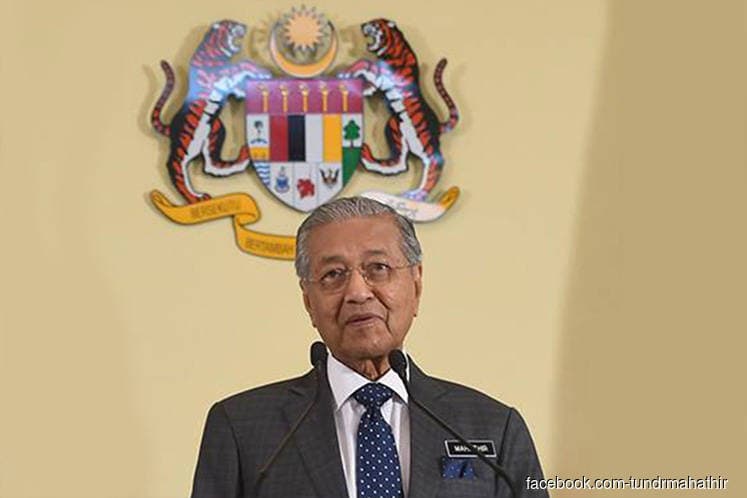
KUALA LUMPUR (July 23): Prime Minister Tun Dr Mahathir Mohamad hopes the Japanese government would offer Malaysia low interest rates and a reasonable repayment period as it had done before, compared with the 6% interest on 1Malaysia Development Bhd (1MDB)’s bonds.
“Malaysia once took a soft loan from Japan with 0.7% interest rate, with a 40-year repayment period. We are not sure if the Japanese government can give the same rate as before, but if we get a lower interest rate, we won’t be burdened by a high debt that has an interest rate of more than 6% the original loan.
“They (Japan) are already considering it and we don't know how much, and what is the rate. We are already talking with the Japanese (government) and it is not easy for them to give soft loan to anybody, they have their own government to satisfy,” he added.
In 2012, 1Malaysia Development Bhd (1MDB) via Goldman Sachs Group Inc raised US$6.5 billion via two issuance of bonds with a coupon rate of 6% for the acquisition of energy assets. The principal of the bonds were guaranteed by Abu Dhabi-based International Petroleum Investment Co, which in return asked for collateral or deposit, totaling US$3.5 billion from 1MDB.
At the same time, Goldman Sachs was said to have earned RM300 million in commission for setting up the debt.
“The previous government’s debt is too high at 6%. Goldman Sachs took a 10% commission from the entire loan which meant that the government only earned 90% of the loan, but had to pay back 100% of the debt,” Dr Mahathir said in reply to Bagan Datuk MP Datuk Seri Zahid Hamidi during questioning time in Parliament.
In a supplementary question, Zahid pointed out that Malaysia was among the large yen credit beneficiaries via the Japanese overseas development assistance in the 1980s and 1990s.
“At that time, the financial crisis was bad due to the appreciation of the yen and this resulted in a huge debt burden. I agree that the interest rate is about 0.7% but what would happen if the yen appreciates (and) the overall cost is high, compared to our ringgit? What if the previous experience repeats itself?” Zahid said.
Zahid suggested domestic borrowing is more effective, although the value is higher because the cost would benefit local institutions.
In response, Dr Mahathir said Malaysia’s national debt then was not more than RM300 billion, which was 27% of the gross domestic product (GDP) then, compared to RM1.087 trillion now.
Urging Zahid to recheck the country’s 'annual reports' in the 1980s and 1990s, which contained the 'real figures' relating to the GDP, Dr Mahathir said he knew 'a little' about economic growth figures, after being the PM for 22 years.
“If you have proof (to show that national debt was high in the 1980s and 1990s), please show (it). We have never owed RM42 billion at one go. We have never had national debt of RM1 trillion.
“In fact, we had never heard of that word (trillion) then. I am not sure if RM1 trillion is less than RM1 billion but for me, RM300 billion is (definitely) less than RM1 trillion,” he said.
Dr Mahathir added that the government has to absorb the debts of its wholly-owned companies or government-linked companies (GLCs), although there is a ceiling debt of 55% to the GDP.
He said this in relation to 1MDB’s RM42 billion debts taken over by the government.
Meanwhile, Dr Mahathir contended that the value of the Japanese yen credit is higher, although the conversion rate of the yen to dollar is lower, compared to the ringgit-dollar conversion.
The Japanese yen is stronger compared to the ringgit when converted to US dollar, which means the loan from Japan would not be cheaper, Dr Mahathir added. To overcome this problem, Malaysia plans to borrow Japanese credit in US dollar.
“One yen is one US cent (but) RM1 is 25 US cent. The lower yen value does not mean the yen credit is cheaper. So, we will borrow yen in US dollar for the amount we owe,” Dr Mahathir said.
Later, when asked by reporters at the Parliament lobby as to how much Malaysia plans to borrow from Japan, he said: “As much as we can”.